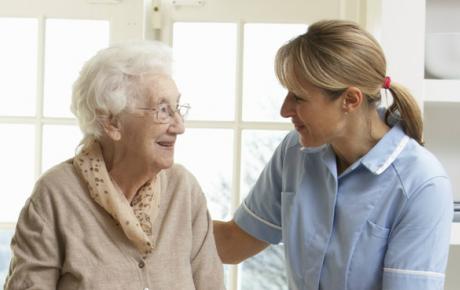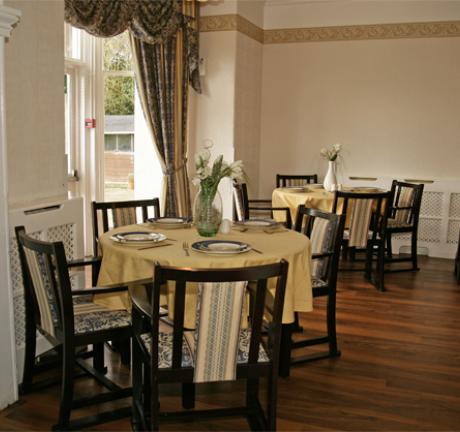Care Policies
Care Policies
Privacy and Dignity
Privacy and Dignity
Staff members are trained to maintain the dignity, individuality and privacy of all service users within a warm and caring environment and in so doing will be sensitive to the service users ever changing needs.

Religion (Worship/attendance of services)
Religion (Worship/attendance of services)
Service users are mostly unable to attended external religious services; however families are encouraged to assist service users to their usual place of worship if this is requested and appropriate. The Home is unable to provide staff to take individuals to religious services, however monthly services do take place at Ashgate House, the details of which are posted on the notice board.
Service users have the right to meet clergy of their chosen denomination at any time and if required, a private room will be made available for such meetings.
Contact with Family and Friends
Contact with Family and Friends
Service user’s family, relatives and friends are encouraged to visit regularly and maintain contact by letter or telephone when visiting is not possible. In these cases, staff will offer to assist the service user to respond where help may be needed. There may be certain circumstances where visits are not allowed (see the General Manager for specific detail).
Visitors will be welcomed at all reasonable times and are asked to let the Person in Charge know of their arrival and departure from the Home. For security and fire safety reasons, visitors must sign in and out of the Visitor’s Book on each occasion.
The service user has the right to refuse to see any visitor and this right will be respected and upheld by the Person in Charge who will, if necessary, inform the visitor of the service user’s wishes.
Visitors are requested to ensure that children are supervised at all times.
Smoking & Alcohol
Smoking & Alcohol
In line with Government Legislation, the Home does not allow smoking in the building.
Alcohol may be permitted following individual discussion with the Home Manager and GP as necessary. The effects of some medication when combined with alcohol can cause complications.
Fire Safety
Fire Safety
The Home has a modern Fire Alarm System fitted with “Fire Exit Notices” and “Fire Emergency Instruction Notices” displayed at strategic points throughout the Home as advised by the local Fire Department.
Staff receive training in Fire Safety every 6 months, this includes the use of fire fighting equipment, evacuation procedures and raising the alarm, etc. Where possible, service users are informed of the emergency procedure on admission.
Weekly fire alarm tests are carried out and fire drills are conducted regularly. We do not practice full evacuations. Where necessary, and unless otherwise instructed by a Fire Officer, any evacuation would be horizontal across the building. Smoke detectors, emergency lighting and fire extinguishers are tested regularly by the Home’s contractors. Records are kept of all fire equipment testing, training and drills.
As required and where possible, all bedding, curtains, furniture and fixtures and fittings are made of fire resistant or fire retardant fabrics and materials.

Risk Assessment and Care Plan Reviews
Risk Assessment and Care Plan Reviews
Once developed, the care plan, which includes risk assessments, will be regularly reviewed to ensure that the plan remains appropriate. Changes in the needs of the service user will result in an immediate review of the care plan and any associated risks. All risks assessments and care plans are reviewed by qualified or care staff as appropriate and, where possible, the plans are formulated and reviewed with the service user and/or their representative.
Relatives are encouraged to participate in the service user’s daily routine as far as is reasonably practicable and are also invited to the formal reviews. Service users and their relatives are always welcome to chat with a member of staff if they have any concerns and, as necessary, concerns are documented and investigated (see Concerns and Complaints section below).
The Care Plan is reviewed at three levels:-
1. Daily on a shift to shift basis: At staff shift changeover, a report on each service user is passed over to the oncoming shift detailing any concerns in condition as necessary. Changes to the Care Plan may be proposed at this point or may have already been made.
2. At the end of the six week settling in period: Following discussions taking place between staff, family and care managers at the review meeting, any concerns are documented and as necessary care plans may be updated.
3. Thereafter a formal written review is undertaken by the named nurse at least on a monthly basis.
All amendments to the risk assessments and care plan are reported to the Home Manager. There are certain amendments that may require the authorisation of the service user’s GP and/or Consultant. All amendments to the care plans are fully documented.
Concerns and Complaints
At Ashgate House we aim to provide the highest standard of care but from time to time there may be areas of concern which need to be discussed. If as a service user, relative or visitor you have any concerns or complaints about the service or indeed any other matter relating to the Home, you are encouraged to discuss these immediately with the person in charge of the shift or the Home Manager if on duty. Concerns/complaints should be brought to the attention of staff immediately, as often there is a simple explanation which will reduce the risk of anxiety. If the matter is in your opinion of a serious nature or if you remain dissatisfied with any explanation that you may have received, your concern/complaint will be formally recorded and investigated by the Home Manager. All concerns/complaints will be investigated and formally responded to within 28 days (the concern/complaints policy and procedure is situated in the entrance to the premises).
If following investigation you are still not satisfied or if you feel that the complaint is of a serious nature and you wish to speak to a Company Director, the Care Quality Commission (CQC) or the Local Authority (Social Services) then the contact details are as follows:
Director: Brian Rosenberg
Director
Ashgate Care Limited
Kable House
Amber Drive
Langley Mill
Nottinghamshire
NG16 4BE
Telephone: 0845 2232949
Fax: 0845 2232959
Care Quality Commission: East Midlands Region
Care Quality Commission
Citygate
Gallowgate
Newcastle-upon-Tyne
NE1 4PA
Telephone: 03000 616161
Local Authority: Derbyshire County Council
(Social Services) Adult Social Services Dept
Matlock
Derbyshire
DE4 3AG
Telephone: 01629 580000
Please also note that if you think the service and care provided by the Home have made a positive difference, then please also tell us. This can be done either verbally or in writing.
A comments box is situated in the entrance area for your use. This can be used to tell us anything you would like us to know.
Concerns and complaints are viewed positively and enables the service to be evaluated and improved upon as necessary.
Advocacy Service
Advocacy Service
At times individuals may require the services of an Advocate to act in their best interest by speaking on the individual’s behalf and/or ensuring a person’s rights are being upheld. In most cases a family member takes on this role but where this is not possible, Advocacy Services will be contacted by the Home.
Information regarding Advocacy Services is available in the entrance to the Home.
End of Life Care
End of Life Care
All staff receive training in End of Life Care. Qualified staff receives more in depth training which enables them to assess pain and anxiety levels and liaise effectively with GP’s, MacMillan Nurses and other agencies as necessary. Relatives are supported by staff, encouraged to visit and kept fully informed of any change in the individual’s condition. Rightcare plans are completed to ensure a rapid response from a doctor or nurse if the individual’s condition warrants this. Following discussion with relatives and if not already in place, EMAS forms are completed by staff at the Home or by the individual’s GP.
Staff will assist relatives/next of kin to make funeral arrangements if requested to do so.
leaving or temporaroly vacating
leaving or temporaroly vacating
The first four weeks following admission shall be regarded as a probationary period for the benefit of the service user and Ashgate. If the service user decides to leave during this probationary period, seven days written notice is required.
If the service user decides to leave at a time following the initial four week period, then four weeks’ notice is required and this must be given in writing. At the end of the four week period, it is expected that all belongings will be removed from the Home. Should belongings not be removed by the end of the notice period, a storage charge will be made which will be equivalent to 50% of the weekly fee charged.
If a service user temporarily moves out of the Home (e.g. to receive hospital treatment), the bed is retained for a period of 6 weeks provided 100% of the normal fee is paid. Following this initial 6 weeks, 80% of the weekly fee is paid.
If a service user leaves the Home to go away on holiday, then the full fee will be paid for the duration of the holiday period.

Medication
Medication
If a service user wishes to self-medicate and it is assessed as being safe to do so, then help and support will be given by staff. Otherwise all medication will be managed, dispensed and ordered by nursing staff under the instructions of the service user’s GP and in line with the Home Medication Administration Policy.
Medicines and practices in the Home is audited by Boots Pharmacist.
Telephone
Telephone
Relatives and friends are encouraged to contact service users by telephone if visits cannot be made. The Home has a cordless telephone which may be taken to individuals as necessary. If required, telephone calls can be made or received in the nurses office or more privately in the service users own room. No charge is made for local telephone calls.
Meals
Meals
Menus are varied and favourite dishes and special diets are catered for. Service users are encouraged to eat in the dining room but may take their meals in any area they wish. At all mealtimes, hot and cold food is available with plenty of choice.
The main meal of the day is served in the evening. Snacks, tea, coffee, other hot drinks and cordial drinks are served at various times throughout the day and available at all times. Visitors are also catered for on request.
Breakfast: from 8:30 am
Coffee and Snacks: from11:00 am
Lunch: from 1:00 pm
Drinks and Snacks: from 3:00 pm
Evening Meal: from 5:00 pm
Supper: from 8:30 pm

Safeguarding from Abuse
Safeguarding from Abuse
All staff are trained to safeguard vulnerable adults from abuse. Abuse is behaviour, whether intentional or unintentional, which causes physical or emotional violation that significantly diminishes the rights of an individual. Abuse can take many forms and be perpetrated by anyone including staff, other service users or visitors.
Service users, staff and visitors are encouraged to act immediately if abuse is witnessed or suspected to enable vulnerable people to be made safe.
All allegations of abuse or suspected abuse will be treated seriously and action taken in line with Derbyshire’s Safeguarding Adults Procedures (2007) as agreed by Derbyshire’s Safeguarding Adults Committee.
All allegations will be reported through to the Safeguarding Team and investigated. Strategy meetings and outcomes will identify any shortfalls in the service and necessary action will be implemented immediately.
Further information regarding Safeguarding is available in the entrance to the Home and useful telephone number are listed below for people who may have concerns but feel unable to discuss these concerns with staff.
Duty Team (Safeguarding): 08456 058058
Local Authority (Social Services): 01629 532184
Care Quality Commission (CQC): 03000 616161
Primary Care Trust (PCT): 01246 514946
Independent Mental Capacity Act Advocates (IMCA): 07903 816652
Brian Rosenberg (Director): 0845 223 2949
Monitoring and quality
Monitoring and quality
A variety of quality monitoring and auditing tools are used to ensure the quality of the service provision and maintain compliance with Legislation, Regulation and best practice. These tools include environmental risk assessments, service and maintenance audits, satisfaction surveys, outcomes from reviews and formal meetings.
Regulating and contracting audits are also undertaken by the Care Quality Commission, Local Authority Contracting Dept and the Primary Care Trust amongst other form Authorities. Inspection and auditing reports are available to view on request.
Where necessary, requirements or recommendations are implemented immediately.
Pets
Pets
Whilst we acknowledge that many people have pets for company during their lifetime, the Home is unable to cater for service users who wish to bring pets with them. At times and following discussion with the Manager, it may be considered to be appropriate for relatives to bring dogs into the Home during short visits.
From time to time “Pat” dogs make visits to the Home.


